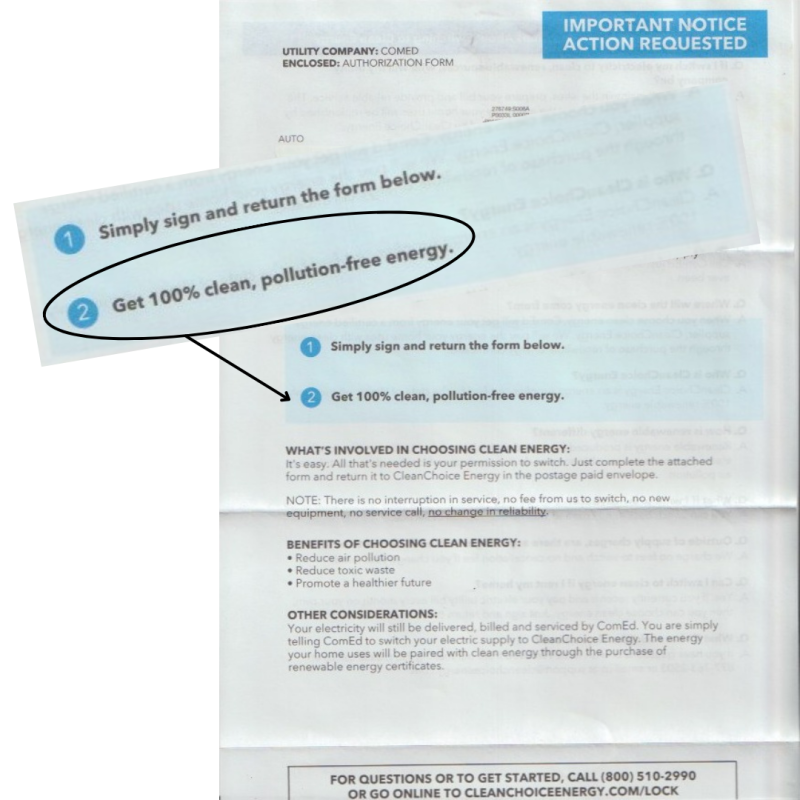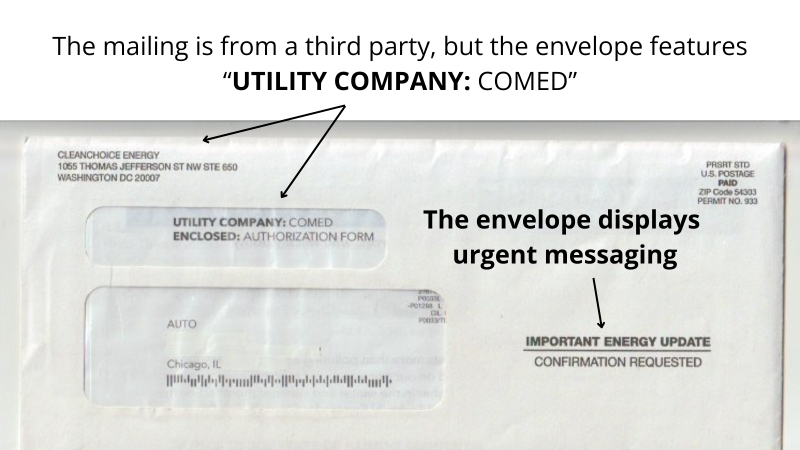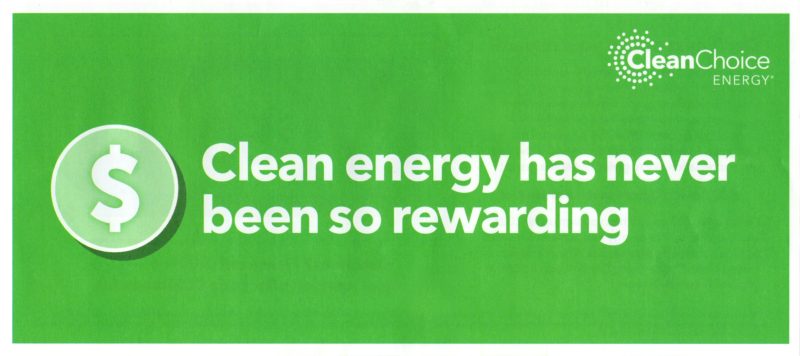Have you received an envelope in the mail that at first glance looks like it could be an urgent message from your utility company? Be careful: It could be another alternative supplier offer.
Such a mailing can be common in Illinois and other states with competitive electricity choice. But here’s why you need to be careful. Since 2015, Illinois consumers have lost more than $1.6 billion to alternative electricity suppliers, according to CUB’s review of reports from the Illinois Commerce Commission’s Office of Retail Market Development.
A couple of CUB staffers have reported getting supplier marketing in the mail–this one is from Clean Choice Energy. If you do get an offer, it’s up to you whether to sign up. Read the fine print carefully, and watch for these possible red flags:
The envelope displays the name of your utility and includes urgent messaging (IMPORTANT ENERGY UPDATE, CONFIRMATION REQUESTED, etc.). Consumers enrolled with e-billing will know that this is not their utility’s typical contact method, but this mailing could be more confusing and concerning if you usually get paper bills. An envelope listing “Utility Company: ComEd” and “Enclosed: Authorization Form” can confuse consumers into thinking it’s an official note from their power company. In this case, you can see that the mailing is from a third party–a company other than your utility.
The pitch sounds like clean energy is being pumped into your home. On a letter displaying an all-caps heading (IMPORTANT NOTICE ACTION REQUESTED), the mailer proclaims “Get 100% clean, pollution-free energy.” The initial advertising may sound like you’re getting clean energy directly pumped into your home. But this isn’t the case. Short of having a solar installation on your roof, nobody can control the sources of their electricity. When you sign up for a “green  offer” from an alternative supplier, you are buying “renewable energy credits.” That means the clean energy you are paying for is being added somewhere on the grid, probably not your TV or microwave. And unless it expressly says so, that clean energy isn’t guaranteed to be from a solar or wind farm in your state. If you’re motivated by clean energy, a better bet is most likely subscribing to a community solar program, so you’ll save money and help reduce pollution in your community.
offer” from an alternative supplier, you are buying “renewable energy credits.” That means the clean energy you are paying for is being added somewhere on the grid, probably not your TV or microwave. And unless it expressly says so, that clean energy isn’t guaranteed to be from a solar or wind farm in your state. If you’re motivated by clean energy, a better bet is most likely subscribing to a community solar program, so you’ll save money and help reduce pollution in your community.
Note: CUB isn’t opposed to people shopping for green plans, we just hate to see people paying for needlessly expensive ones. Your community may offer a municipal aggregation deal with a more reasonably priced clean energy offer.
 High price. What’s the rate being advertised and how does it stack up to your utility’s price listed on CUB’s electric page? In this example, when you get past all the talk about rewards and 100 percent clean energy, CUB found on the backside of the letter that you would get charged a rate fixed for 12 months that was about 60 percent higher than ComEd’s rate at the time. (If the price does seem reasonable, watch for seemingly low introductory rates that skyrocket after a brief period. Always ask if the price you’re being offered is a promotional rate.)
High price. What’s the rate being advertised and how does it stack up to your utility’s price listed on CUB’s electric page? In this example, when you get past all the talk about rewards and 100 percent clean energy, CUB found on the backside of the letter that you would get charged a rate fixed for 12 months that was about 60 percent higher than ComEd’s rate at the time. (If the price does seem reasonable, watch for seemingly low introductory rates that skyrocket after a brief period. Always ask if the price you’re being offered is a promotional rate.)
Automatic renewal. The offer in this example is a high fixed rate for 12 months that then automatically renews “on a month to month basis.” That sounds like it switches to a variable rate that can change monthly. What will the new rate be each month? It’s impossible to know right now. The company says: “At least 30 days and no more than 60 days before your initial contract term expires, we will send you additional information about renewal.” But such notifications can get lost in the pile of mail we receive. Be careful. CUB hears of a lot of people who get slammed with painfully high variable rates after that initial term.
Enticing rewards. Many offers include perks such as gift cards, rebates, flight miles, even Disney World tickets. We like cool rewards too–but we like reasonable electricity rates even better.Read the fine print to see what your rate will be, and then decide if the reward is worth going with the offer.
If you get a letter in your mailbox that seems to require your immediate attention, always pause, take a breath, and read carefully. It’s likely that letter isn’t from your utility. Remember, you don’t have to sign up with an alternative supplier. There is a whole menu of other electricity options to consider that can help you save money and reduce your carbon footprint (energy efficiency programs offered by your utility or a community solar program, for example). We list them at the end of this recent alternative supplier warning we posted on our WatchBlog.
If you want to check your bill, here’s how to tell if you’re signed up with an alternative supplier.



